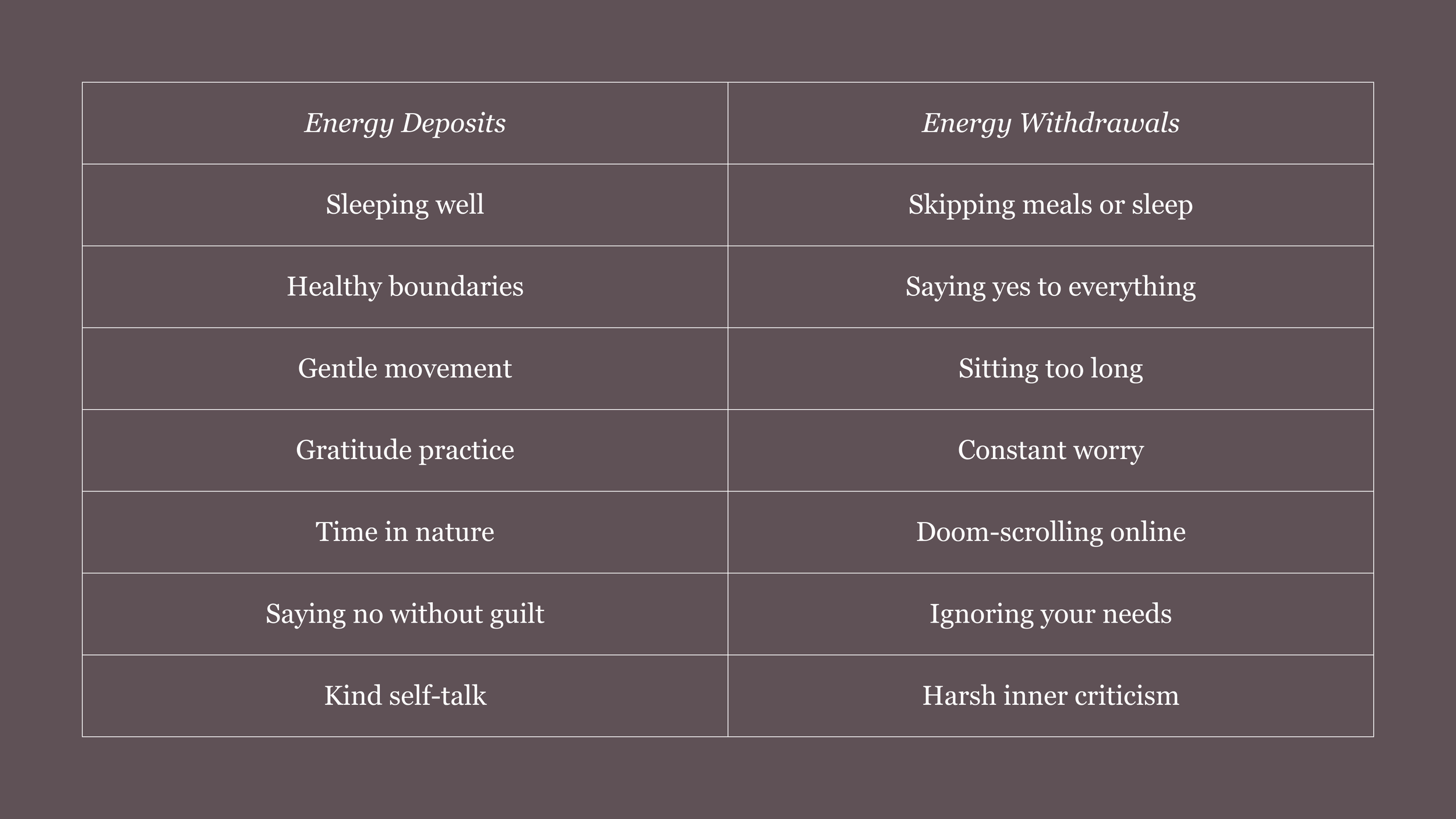The Emotional Bank Account
How We Drain or Replenish Our Own Energy
We all understand how a bank account works, you make deposits, take withdrawals, and try to maintain a positive balance. If you constantly overspend without topping it up, the account goes into overdraft. What if we thought about our emotional energy in the same way?
Your Emotional Bank Account is a metaphor for the mental, emotional, and physical energy you have available at any given time. Every task, interaction, or thought either adds to or drains that account. And just like a real bank account, when the balance is low, it affects everything.
What Is an Emotional Bank Account?
Your Emotional Bank Account represents your inner capacity to deal with life. Your patience, resilience, focus, motivation, and ability to cope with stress. It’s the energy that fuels how you show up for work, home life, relationships, and most importantly, for yourself.
Think of it as your internal battery. When it’s fully charged, you feel balanced, capable and motivated. When it’s depleted, even the smallest task can feel overwhelming.
Your energy is a currency - spend it wisely.
How we make deposits (energy builders):
Deposits are the things that restore and strengthen your emotional reserves. These are personal and often simple, but easy to neglect when life gets busy.
Some common deposits:
Getting enough sleep
Eating regularly and nourishing your body
Moving your body (not just for fitness, for energy!)
Practising mindfulness or stillness
Spending time with people who uplift you
Creating something (writing, painting, cooking, etc.)
Setting boundaries and saying no when needed
Completing small tasks (a sense of achievement matters)
Laughing, playing, resting
The key is to notice what makes you feel recharged, even just a little, and prioritise those activities.
How we make withdrawals (energy drains):
Withdrawals are anything that uses up your emotional, mental, or physical energy. Some are necessary, and part of everyday life. But when withdrawals outweigh deposits, that’s when we feel depleted.
Common emotional withdrawals:
Overcommitting and saying yes too often
Skipping meals or not drinking enough water
Poor sleep or irregular schedules
Constant screen time without breaks• Ignoring your own needs to take care of others
Negative self-talk and harsh inner criticism
Chronic stress or unprocessed emotions
Procrastination or unfinished tasks
Comparing yourself to others constantly
It’s not about avoiding all of these, life is messy and demanding, but about balancing them with regular deposits.
What happens when you’re in emotional overdraft?
When your Emotional Bank Account gets low, it can show up in sneaky but serious ways:
Constant fatigue
Low motivation
Brain fog or difficulty focusing
Feeling overwhelmed by small tasks
Irritability or emotional reactivity
Loss of joy in things you used to enjoy
Trouble sleeping, or sleeping too much
Feeling detached, disconnected, or numb
If you’re running on empty for too long, your system may start forcing you to stop — through burnout, illness, or emotional shutdown.
How to start rebuilding your balance:
You don’t need to overhaul your entire life. Begin by noticing how you feel. Then ask yourself:
“Is this an emotional deposit or a withdrawal?”
Practical steps to help restore your energy:
Schedule rest like a meeting and treat it as non-negotiable
Move your body gently, walking counts
Switch off from screens, even for 10 minutes
Drink more water, dehydration mimics exhaustion
Unfollow or mute draining content on social media
Set limits on giving, people-pleasing is expensive
Speak to yourself like you would a friend
Celebrate progress, not perfection
Little consistent deposits, done regularly, are far more powerful than one big retreat or holiday.
Emotional maintenance is not selfish, it’s survival
We often treat self-care like a luxury, but it’s not. It’s a necessity. You wouldn’t expect your car to run without petrol, so why expect your mind and body to perform without replenishing what’s been spent?
When your Emotional Bank Account is full:
You think more clearly
You respond rather than react
You make better decisions
You have more empathy, even for yourself
You actually enjoy life more
Quick self-check: Are you depositing or withdrawing?
Here’s a simple guide you can use anytime:
Final thoughts:
The truth is, we can’t always control what life throws at us. But we can learn to check in with ourselves, listen to our needs, and take small actions to keep our Emotional Bank Account in good shape.
You matter. Your energy matters. Don’t wait until you're in overdraft to start taking care of your emotional well-being.
Start today, even with just one deposit.

